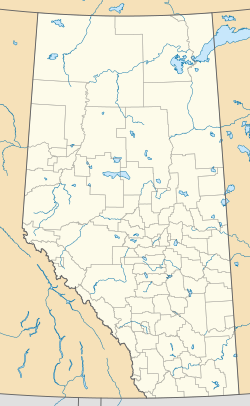Cherhill, Alberta
Cherhill | |
|---|---|
 An entrance sign of Cherhill | |
Location of Cherhill in Alberta | |
| Coordinates: 53°49′09″N 114°40′38″W / 53.8192°N 114.6772°W | |
| Country | Canada |
| Province | Alberta |
| Census division | No. 13 |
| Municipal district | Lac Ste. Anne County |
| First post office | 1911 |
| Government | |
| • Type | Unincorporated |
| • Reeve | William Hegy |
| • Governing body | Lac Ste. Anne County Council
|
| Population (2008)[1] | |
• Total | 60 |
| Time zone | UTC−7 (MST) |
| • Summer (DST) | UTC−6 (MDT) |
Cherhill is a hamlet in Alberta, Canada within Lac Ste. Anne County.[2] It is located along Highway 43, approximately 35 kilometres (22 mi) east of Mayerthorpe and 82 kilometres (51 mi) northwest of Edmonton.
The hamlet is located in census division No. 13.
The first syllable of the Cherhill's name is derived from the last syllable of the name of A. P. Stetcher, the postmaster when the post office opened in 1911,[3] with "hill" added to it.[4]
Demographics
[edit]As of a 2008 census conducted by Lac Ste. Anne County, the population of Cherhill was 60.[1]
See also
[edit]- List of communities in Alberta
- List of hamlets in Alberta
- Cherhill, Wiltshire, England
References
[edit]- ^ a b "Alberta Population Summary: Alberta's Hamlets Alphabetically, 2010" (PDF). Alberta Population. Archived from the original (PDF) on December 11, 2021. Retrieved September 25, 2021.
- ^ "Specialized and Rural Municipalities and Their Communities" (PDF). Alberta Municipal Affairs. June 3, 2024. Retrieved June 14, 2024.
- ^ Place-names of Alberta. Ottawa: Geographic Board of Canada. 1928. p. 32.
- ^ Lac Ste. Anne Historical Society. Archives Committee (1959). West of the Fifth: a history of Lac Ste. Anne Municipality. Edmonton, Alberta: The Institute of Applied Arts Ltd. p. 141.
- ^ Ninth Census of Canada, 1951 (PDF). Vol. SP-7 (Population: Unincorporated villages and hamlets). Dominion Bureau of Statistics. March 31, 1954. Retrieved September 22, 2024.
- ^ Census of Canada, 1956 (PDF). Vol. Population of unincorporated villages and settlements. Dominion Bureau of Statistics. October 25, 1957. Retrieved September 23, 2024.
- ^ 1961 Census of Canada: Population (PDF). Series SP: Unincorporated Villages. Vol. Bulletin SP—4. Ottawa: Dominion Bureau of Statistics. April 18, 1963. Retrieved September 25, 2024.
- ^ Census of Canada 1966: Population (PDF). Special Bulletin: Unincorporated Places. Vol. Bulletin S–3. Ottawa: Dominion Bureau of Statistics. 1968. Retrieved September 25, 2024.
- ^ 1971 Census of Canada: Population (PDF). Special Bulletin: Unincorporated Settlements. Vol. Bulletin SP—1. Ottawa: Statistics Canada. 1973. Retrieved September 25, 2024.
- ^ "Geographical Identification and Population for Unincorporated Places of 25 persons and over, 1971 and 1976". 1976 Census of Canada (PDF). Supplementary Bulletins: Geographic and Demographic (Population of Unincorporated Places—Canada). Vol. Bulletin 8SG.1. Ottawa: Statistics Canada. 1978. Retrieved September 26, 2024.
- ^ 1981 Census of Canada (PDF). Place name reference list. Vol. Western provinces and the Territories. Ottawa: Statistics Canada. 1983. Retrieved September 26, 2024.
- ^ 1986 Census of Canada (PDF). Population. Vol. Unincorporated Places. Ottawa: Statistics Canada. 1988. Retrieved September 26, 2024.
- ^ 91 Census (PDF). Population and Dwelling Counts. Vol. Unincorporated Places. Ottawa: Statistics Canada. 1993. Retrieved September 26, 2024.
53°49′09″N 114°40′38″W / 53.81917°N 114.67722°W


 French
French Deutsch
Deutsch